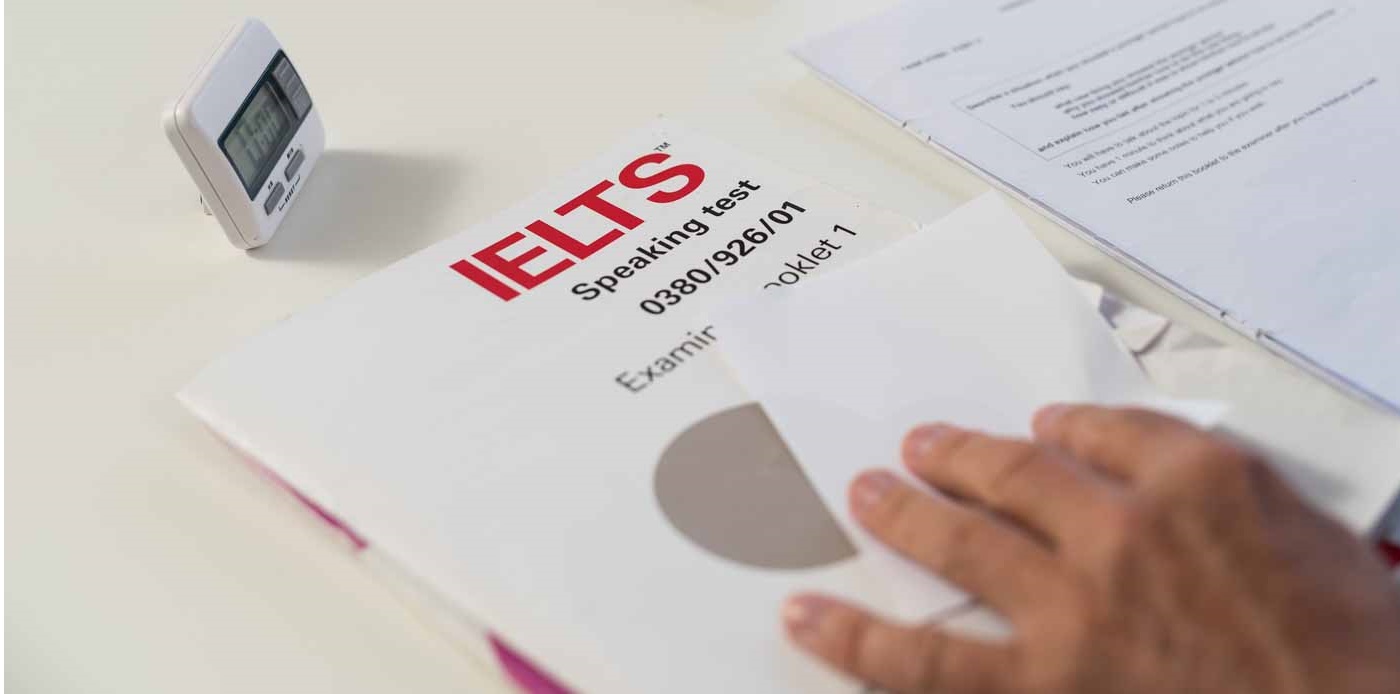IELTS Cue Card شماره 3: توصیف موقعیت ملاقات با یک فرد برای اولین بار
IELTS Cue Card شماره 3
یکی دیگه از سوالات مهارت مکالمه آیلتس که ممکنه شما باهاش برخورد کنید اینه که یک موقعیت خاص که برای اولین بار با یک شخص ملاقات دارید رو توصیف کنید:
Describe an occasion when you met someone for the first time.
شما برای پاسخ باید از خودتون این سه سوال رو بپرسید:
| کجا آنها رو ملاقات کردید؟ | Where you met them |
| کی آنها رو ملاقات کردید؟ | When you met them |
| درباره چی صحبت کردید؟ | What you talked about |
و در آخر باید احساستون رو درباره اون ملاقات بیان کنید.
سوالات بخش سوم آیلتس که در ادامه توضیح داده شده:
*Do you think it’s strange to meet friends online?
*Why do some people have few friends?
*Why is more important: new friends or old ones?
*How do companies welcome their new employees?
پاسخ نمونه
مثل اغلب مردم من هم توی سالیان زندگیم تجربه ملاقاتهایی برای اولین بار رو داشتم و به علاوه از طرفی من شغلم در زمینه گردشگری بود و بنابراین ملاقات با افراد جدید شاید یه فعالیت روزانه من به حساب میومد.
شغل قبلی من مسئول پذیرش در یک کمپ گردشگری بود و به طور قطع پذیرش مهمانها و معاشرت کردن با اونا یه قسمت اصلی از شغلم بود. اغلب آدمایی که اونجا ملاقات میکردم خیلی آدمای خوبی بودن اما خب فراموش شدنی بودن. تعدادشون زیاد بود و من قطعا نمیتونم همه رو به یاد بیارم اما میتونم بگم که تعداد قابل توجهی از اون آدما توی ذهنم موندن و یه چند تایی هم برام دوستای خوبی شدن.
یکی از اون افراد که به طور خاص توی ذهنم مونده، شخصی بود اهل استرالیا و یه شخصیت خیلی جالبی داشت. در اون موقع یه مشکلی در مورد سیستم رزرو پیش اومده بود و وظیفه من بود که اون مشکل رو حل کنم. طبیعیه که مشکلات و اشتباهات پیش میاد. شاید بتونم بگم که ماهی یک بار ما این مشکل رو با سیستم رزرو داشتیم چون خب خیلی سرمون شلوغ بود و خیلی وقتا به اندازهای که مسافر داشتیم اتاق خالی نداشتیم.
اغلب مهمونامون هم آدمای حساسی نبودن و اگه ما مجبور میشدیم تغییراتی توی برنامه شون بدیم یا اتاقشون رو با یه اتاق ارزونتر عوض میکردیم، اعتراضی نداشتن و به خاطر این اتفاق بعضی وقتا ما به اونا یه سری گزینههای جانبی میدادیم. چیزهایی مجانی بهشون میدادیم اما این مهمون استرالیایی ما یه مقداری متفاوت بود. ابتدا شروع کرد به صحبت کردن و بحث کردن و اینا و سعی داشت که یه سری گزینههای بیشتری رو بصورت مجانی از ما بگیره.
البته که خیلی آدم مودبی بود و در مکاتبات ایمیلی که با هم دیگه داشتیم خیلی دوستانه به نظر میرسید که خیلی من رو شگفت زده کرد و برام تعجب آور بود و خیلی مشتاق بودم وقتی که میاد اینجا ببینمش. پس یه یادداشتی برای خودم تو ذهنم داشتم و گفتم که حتما حواسم باشه که کی میاد که ببینمش و باهاش یه سلام و احوال پرسی داشته باشم.
وقتی که رسید به کمپ ما و اسمشو گفت من خندیدم و بهش توضیح دادم که من کی هستم و در اصل من همون شخصی بودم که ایشون باهاش در ارتباط بود. با من دست داد و از من معذرتخواهی کرد برای مذاکره سخت و سنگینی که با من داشت سر اتاق و این بحثا اما توضیح داد که اون کارش فروشندگیه و مذاکره کردن یه عادته براش و دست خودش نیست.
اون روز عصر من کاری نداشتم و تصمیم گرفتم که با هم بریم یه نوشیدنی بخوریم و چرخی بزنیم و دیدیم که خیلی با هم جور شدیم و مدتی که توی لندن بود ما با هم واقعا دوستان خوبی شدیم.
Sample Answer:
Like most people, I’ve met quite a number of new people over the years. However, I used to work in the tourism industry, and so meeting new people on a daily basis wasn’t anything unusual.
I used to work as a receptionist in a backpacker hostel. Checking in guests and being social was literally part of my job description. Most of the people I met were pleasant, but forgettable, but quite a number were memorable and a handful became good friends.
One in particularsticks out in my mind. He was from Australia and was quite a character.
It happened that we’d made a mistake with his booking and I was tasked with sorting it out. Mistakes happen, and perhaps once a month there would be a problem with a booking and it was usually because we were overbooked.
Most guests weren’t fussed if we had to downgrade them to a cheaper room, and to say sorry we’d offer them some free perks.
This Aussie guest was a little bit different. He started negotiating and trying to get a lot more freebies. He was extremely polite and our email exchanges were very friendly. This guest intrigued me and I was eager to meet him in real life.
I made a mental note as to when he was due to check in, and was looking forward to saying hello.
When he arrived and said his name, I laughed and explained who I was, and that it was me he’d been corresponding with. He shook my hand and apologized for negotiating so hard, but said he worked in sales and so negotiating was a habit for him.
I wasn’t working that evening and we decided to go grab a beer and hang out for a while. We really clicked and for the time he was still living in London we became really good friends.
لغات و اصطلاحات پاسخ نمونه
Over the years (idiom)
This phrase is used to describe a period of some, several, or many years.
Example: This town has changed a lot over the years; I hardly recognize it.
در طول سالیان
این شهر در طول سالیان خیلی تغییر کرده؛ به سختی میتونم به یادش بیارم.
Forgettable (adjective)
Something that’s likely to be forgotten really quickly because it’s not very interesting or special.
Example: A lot of TV sitcoms are very forgettable because they’re so cliché.
فراموش شدنی
بسیاری از برنامههای تلوزیونی فراموش شدنی هستن چرا که خیلی کلیشهاند.
Memorable (adjective)
If something is memorable, it’s very likely to be remembered because it’s special in some way.
Example: That vacation we took to China was extremely memorable.
به یاد ماندنی
سفر تفریحی که به چین داشتیم بسیار به یاد ماندنی بود.
Handful (noun)
A handful is a small number of people or things.
Example: She invited all her friends to the party, but only a handful of them turned up.
یک مشتی، یه چندتایی
او تمام دوستاشو به مهمونی دعوت کرده بود اما فقط یه چندتاییشون اومدن.
In particular (idiom)
It’s a synonym of especially.
Example: I liked that last candidate in particular.
خصوصا
بطور خاص از کاندیدای آخر خوشم اومد.
Sticks out (phrasal verb)
Something that’s very noticeable because it’s different is said to stick out.
Example: If you dye your hair purple and blue, you’ll really stick out at work.
به چشم آمدن، جلب توجه کردن
اگر موهاتو آبی و بنفش کنی واقعا در محل کارت به چشم میای.
Quite a character (idiom)
If someone is quite a character, they have a lot of personality or individuality, and this can be unusual or surprising. They’re not typical and can be quite unusual, and possibly very unique. It can be a good thing or a bad thing.
Example: I found James to be quite a character. I’ve never met anyone like him before.
شخصیت جالبی داشتن، شخصیت خاصی داشتن
جیمز به نظرم شخصیت خیلی خاصی اومد. هیچ کسی رو مثل اون ندیدم.
Tasked (verb)
If you’re tasked with something, you’re given a task or a specific job to do.
Example: We’ve been tasked with selling 300 cookies a day to people commuting to work.
وظیفهای را بر عهده داشتن
وظیفه فروختن 300 کلوچه در روز به مردمی که سر کار میروند به ما محول شده است.
Sort it out (phrasal verb)
If you sort out something, it means to deal with something. In this case, it’s to fix a problem.
Example: It took me a long time to sort it out, but eventually we did it.
راه حلی پیدا کردن، مشکلی رو حل کردن
خیلی طول کشید تا بتونیم حلش کنیم اما رفته رفته انجامش دادیم
Overbooked (adjective)
If a hotel, airline, bus company, etc, has sold more tickets than there are rooms or seats, they’re said to be overbooked.
Example: Many flights are often overbooked because sometimes passengers don’t arrive for their flight on time.
وقتی که مثلا در یک هتل تعداد بلیتهای فروخته شده از تعداد اتاقها بیشتر باشه این صفت به کار میره
در بسیاری از پروازا بلیت بیشتر از تعداد صندلیها فروخته میشه چرا که بسیاری از مسافرا بعضا به پروازشون نمیرسند.
Fussed (verb)
If you’re fussed over something, you’re worried or troubled over insignificant or minor things.
Example: I’m not fussed where we eat.
وسواس به خرج دادن
حساس نیستم که کجا غذا بخوریم.
Downgrade (verb)
To give someone a worse quality or level on a plane, or at a hotel. For example, you may be given a worse seat on a plane than you paid for, or a worse room in a hotel than you booked.
تنزل دادن، پایین آوردن
Perks (noun)
Any kind of extra payment, benefits, or advantage from a situation.
Example: The hotel gave us some extra perks, like free massages and a better room for being loyal customers.
مزایا
هتل به خاطر اینکه ما مشتریان وفاداری بودیم بهمون یه سری مزایای اضافی داد. مثل ماساژ رایگان و اتاقهای بهتر.
Aussie (noun)
Someone who comes from Australia.
Example: There are lots of Aussies in London in the winter.
استرالیایی
استرالیاییهای زیادی در زمستان در لندن هستند.
Freebies (noun)
Anything that’s given to you without you having to pay for it. It’s usually something that you’d have to pay for under normal circumstances.
Example: They were giving out freebies of a new diet drink at the mall.
چیزی که مجانی به شما داده بشه
توی مرکز خرید داشتن نوشابه رژیمی مجانی توزیع میکردند.
Hang out (phrasal verb)
If you spend a lot of time somewhere you are said to hang out there. You can also hang out with people too.
Example: I’ve been hanging out all day at the beach.
وقت گذرندون، گشتن
تمام روز توی ساحل داشتم میگشتم.
Click (verb)
If you click with someone, you become friends with someone very quickly because you immediately because you like and understand each other.
Example: Mary and Bob didn’t click at all and hated each other from the start.
با هم جور شدن
مری و باب اصلا با هم جورنشدند و از همون اولش از هم متنفر بودند.
حالا بریم سراغ یه سری سوالاتی که در بخش سوم آزمون اسپیکینگ آیلتس ممکنه باهاش مواجه بشیم.
Do you think it’s strange to meet people online?
پاسخ نمونه
قطعا نه. من فکر میکنم که خیلیا از طریق سایتهای دوستیابی و بصورت آنلاین با هم دوست میشن و خیلیا رو میشناسم که دوستاشون رو از طریق اینترنت پیدا کردند و باهاشون آشنا شدند. همین طور نرمافزارهای دوستیابی خیلی رایج هستند و خیلی هم استفاده میشن.
البته فکر میکنم اوایل یه سری بدبینیها نسبت به سایتهای دوستیابی وجود داشت اما به نظرم طی سالیان اونا هم از بین رفته و کاملا عادی هستند. خب قبلا یه ترسایی نسبت به اونا وجود داشت و چند تا داستان بودن که هشدار میدادند و چیزایی که مثلا چاپ میشد در روزنامهها و رسانهها در مورد اتفاقات و حوادثی که برای بعضیها افتاده اما به نظرم دیگه این روزا خیلیا فهمیدن که این شاید فقط یه وحشت پراکنی باشه و چیزی نیست که بخوایم در موردش نگران باشیم. میتونم به شخصه بگم که خیلی آدمای باحالی رو توی فضای آنلاین دیدم و باهاشون آشنا شدم. چون توی زندگی من خیلی جابجا شدم و به مکانهای مختلفی نقل مکان کردم، میتونم بگم اگر این روشها نبود شاید برام دوست پیدا کردن خیلی سخت میشد.
Sample Answer:
Absolutely not. I think a lot of people make new friends online, and many people have met their boyfriend or girlfriend on the internet.
Apps to help people meet new people are extremely common and widely used. I think there used to be a little bit of a stigma surrounding these apps, but that has disappeared over the years.
There also used to be a lot of fear about meeting strangers from the internet. There were a few cautionary tales that would be published in the media from time to time, but most people realized it was just scaremongering and there was nothing to worry about.
Personally I’ve met a lot of really cool people because of the internet. I’ve moved a number of times and I’d have found it really difficult to make new friends otherwise.
لغات و اصطلاحات پاسخ نمونه
Stigma (noun)
If people think a behavior, situation, or sickness is something to be ashamed of, or that society disapproves of, especially when this is unfair, it’s said to be stigmatized. Often people can feel embarrassed if society has stigmatized them.
Example: In some parts of the world, mental illness still has a stigma but this is becoming less common.
برچسب، انگ
در بعضی از نقاط دنیا بیماریای روانی هنوز یه جور انگ حساب میشن اما این وضعیت داره کمتر و کمتر میشه.
Cautionary tale (noun)
A cautionary tale is a story that gives some kind of warning for the future.
Example: Many journalists have written cautionary tales of smokers that died of smoking-related diseases.
داستان اخطارآمیز
بسیاری از روزنامه نگاران داستانهای هشدار دهندهای نوشتند در مورد سیگاریایی به خاطر بیماریهای مرتبط با سیگار کشیدن از بین رفتهاند.
From time to time (idiom)
If something happens from time to time, it happens sometimes but not very often.
Example: I still think of him from time to time.
هر از گاهی
هر از گاهی بهش فکر میکنم.
Scaremongering (noun)
The process of telling stories or doing something to make people feel worried or frightened. Often the stories aren’t completely true, or the stories are spread so that someone can profit from people’s fear.
Example: There’s been a lot of scaremongering in the media about the economy.
ترس پراکنی
در رسانهها در مورد وضعیت اقصاد بسیار ترس پراکنی شده است.
سوال بعدی که ممکنه در بخش سه باهاش برخورد داشته باشید:
Why do some people have few friends?
پاسخ نمونه
شاید اونا واقعا خجالتی هستن و خیلی براشون سخته که با آدمای غریبه یا کسانی که جدید میبینن بخوان صحبت کنن. خیلی از مردم خودشون رو درون گرا فرض میکنن و براشون خیلی سخته که دوستای جدیدی پیدا کنن. شاید واقعا توی مهمونیها و در کل جاهایی که آدمای زیادی باشن و اونا رو نشناسن میترسن و سعی میکنن در اولین فرصت یه جورایی از اونجا فرار کنن.
بعضیای دیگه هم هستن که واقعا به کیفیت اهمیت میدن تا کمیت و ترجیح میدن که فقط چندتایی دوست واقعا خوب داشته باشن به جای اینکه مثلا تعداد زیادی از دوست و آشناهای معمولی داشته باشن. اونا کسایی هستن که دوستای نزدیکشون رو برای مدت خیلی زیادیه که میشناسن و احتمال زیاد با اونا بزرگ شدن و با دوستاشون بالا و پایینای زندگی رو دیدن و به اونا یه حسی شبیه اعضای خونواده دارن.
البته تعداد کمی هم هستند همیشه به خاطر این که به تازگی به جایی نقل مکان کردن کسی رو نمیشناسن و دوست ندارن و دلیلش هم واضحه که چون افراد زیادی رو ملاقات نکردن با کسی آن چنان ارتباط ندارن. احتمالا شاید با همکار یا همسایهای ارتباط برقرار کرده باشن اما به معنای واقعی دوست نشدن.
Sample Answer:
Maybe they’re really shy and struggle to talk to new people. Many people would consider themselves to be introverts and find it difficult to make new friends. Maybe they feel intimidated at parties where they don’t know many people, and might slink away at the first opportunity.
Other people possibly prefer quality over quantity. They’d rather have a few really close friends instead of a large number of casual acquaintances that they don’t know really well. They’ve probably known their close friends for forever and a day, and possibly even grew up with them. They’ll have gone through thick and thin with them, and they would feel like family.
There will also be a subset of the population that have just moved somewhere new. Maybe they’ve moved to a new city or even a new country, and they haven’t really met many people yet. Perhaps they’ve befriended a neighbor or a work colleague, but haven’t really had a chance to make many new friends.
لغات و اصطلاحات پاسخ نمونه
Introvert (noun)
An introvert is a person who generally prefers being by themself and likes to do activities alone. They may avoid large groups of people. The opposite of an introvert is an extravert.
Example: Mary is introverted and would rather play Monopoly than go to a party.
درونگرا
مری درونگراست و ترجیحش اینه که توی خونه بازی کنه یا اینکه بره به یه مهمونی.
Intimidated (adjective)
If you feel intimidated, you feel frightened or nervous because you’re not confident in a situation.
Example: Older people tend to feel intimidated by computers.
وحشت زده
افراد مسن احتمالا کامپیوتر وحشت زدهشون میکنه.
Slink away (idiom)
If you slink away, you leave somewhere in a quiet and sometimes sneaky way so that people won’t notice you leaving.
Example: I was so bored at the party, the only thing I could do was to slink away at the first opportunity.
جیم زدن، یواشکی فرار کردن
توی مهمونی اونقدری خسته شده بودم که تنها کاری که میتونستم بکنم این بود که در اولین فرصت جیم بزنم.
Quality over quantity (phrase)
This phrase means it’s more important to get something that’s a better quality than it is to get lots of things that aren’t such good quality.
Example: I always prefer quality over quantity when it comes to wine. I’d rather have one really good bottle of wine instead of several lower quality bottles.
ترجیح کیفیت به کمیت
من همیشه در مورد نوشیدنی کیفیت رو به کمیت ترجیح میدم. ترجیحم اینه که یک شیشه نوشیدنی با کیفیت داشته باشم تا این که چند شیشه نوشیدنی کم کیفیت
Casual acquaintance (noun)
Someone you have met. You know each other, but you don’t know each other very well and you don’t see each other often.
Example: She’s just a casual acquaintance of my family in Boston.
آشنای معمولی
او فقط یه آشنای معمولی خونوادمه در بوستون
For forever and a day (idiom)
If something lasts for forever and a day, it can mean a very long time, but not actually for forever.
Example: We’ve been driving for forever and a day and we’re still not there yet.
برای مدت خیلی زیادی
صد ساله داریم رانندگی میکنیم اما هنوز به اون جا نرسیدیم.
Grew up (phrasal verb)
To change from being a baby or young child to being an older child or adult.
Example: She’s really starting to grow up now.
رشد کردن
او دیگه واقعا داره بزرگ میشه.
Through thick and thin (idiom)
To stay with someone, or keep doing something through good times and bad times.
Example: We’ve been friends for 20 years, through thick and thin.
در سرد و گرم روزگار، با بالا و پایینهای زندگی
ما با وجود تمام بالا و پایینای زندگی بیست ساله که با هم دوستیم.
Subset (noun)
A small group of people or things that is part of a larger group.
Example: We asked a small subset of the town’s population for their opinion.
گروه کوچکی، تعداد کمی
نظر گروه کوچکی از آدمای شهر رو پرسیدیم.
Befriend (verb)
To make friends with someone and treat them in a kind way.
Example: He befriended me at a party.
دوست شدن
او با من در یه مهمونی دوست شد.
یه سوال دیگه از بخش سوم مصاحبه آیلتس :
What is more important: new friends or old ones?
پاسخ نمونه
فکر میکنم که هردو شون مهم هستن. من دوستام برام به یک اندازه ارزش دارن چه اونایی که برای مدت زیادی میشناسم و چه اونایی که شاید یه چند ماهیه که باهاشون آشنا شدم و به نظرم این خیلی مهمه که آدم به دوست یابی ادامه بده و ارتباطاتش رو گسترش بده.
آدما میان و میرن و بعضی وقتا ممکنه دوستای صمیمی آدم به جای دیگهای برن البته که هر کسی سعیش رو میکنه که ارتباطش رو حفظ کنه و اگه امکانش باشه با دوستاش وقت بگذرونه اما خب بعضی وقتا این سخت میشه و واقعا فاصله باعث میشه آدم ارتباطش رو با کسی از دست بده. به همین دلیل من خیلی خوشحال میشم و خوش آمد میگ به فرصتهای جدید برای دوست پیدا کردن و این باعث میشه که اگر کسی ازم دور شد یا ارتباطی قطع شد این حس بهم دست نده که دایره ارتباطات اجتماعیم کوچیک شده.
Sample Answer:
I think both are important. I value the friends I’ve known for what feels like a lifetime just as much as the friend I’ve known for a few months.
I think it’s essential to keep making new friends. People come and go, and sometimes a really close friend or two can move away to a new city. Of course we do our best to stay in touch, and hang out as much as possible, but it can be difficult and sometimes people just drift away because of the distance.
Because of this, I always welcome the opportunity to make new friends. That way I don’t feel like my social circle shrinks as much if someone moves away.
لغات و اصطلاحات پاسخ نمونه
Come and go (idiom)
If someone is present for a limited period of time, and then leaves or disappears, they are said to come and go. Things can come and go too.
Example A: Over the centuries we’ve seen many civilizations come and go.
Example B: Friends can come and go, but family is there for a lifetime.
آمدن و رفتن
(A) در طول قرنها شاهد بودهایم که بسیاری از تمدن ها آمده و رفتهاند.
(B) دوستا میان و میرن ولی خونواده همیشه سر جاش هست.
Move away (phrasal verb)
To stop living somewhere and to go live in another place.
Example: He used to live in Boston but he moved away a long time ago.
نقل مکان کردن
قبلا توی بوستون زندگی میکرد اما خیلی وقت پیش از این جا رفت.
Stay in touch (idiom)
If you stay in touch with someone, you maintain contact with them.
Example: It can be really hard to stay in touch with all my friends from school.
در تماس بودن
بعضی وقتا واقعا سخته که ارتباطم رو با تمام دوستان مدرسهام حفظ کنم.
Hang out (phrasal verb)
If you spend a lot of time somewhere you are said to hang out there. You can also hang out with people too.
Example: I’ve been hanging out all day at the beach.
وقت گذروندن، گشتن
تمام روز رو توی ساحل میگشتم.
Drift away (idiom)
To gradually become distant from someone that you used to be close to.
Example: Phil an I never had a big fight or anything, but we just drifted away from each other over the years and we hardly ever see each other now.
بطور تدریجی ارتباط رو از دست دادن
فیل و من هیچ دعوای بزرگی نداشتیم اما به مرور زمان رابطهمون سرد شد و از هم دور شدیم و حالا به ندرت همدیگه رو میبینیم.
Welcome the opportunity (phrase)
If you welcome an opportunity you are pleased to have the chance to do something.
Example: She welcomed the opportunity to do something different.
استقبال کردن از فرصتی
او استقبال کرد از این فرصت که چیز جدیدی رو انجام بده.
Social circle (noun)
A social circle is a group of people that are socially connected.
Example: John didn’t want to be part of her social circle.
دایره روابط اجتماعی
جان نمیخواست که یه قسمتی از دایره ارتباطات اون باشه.
سوال بعدی در بخش سوم مصاحبه آیلتس:
How do companies welcome new employees?
پاسخ نمونه
به نظرم شرکتهای مختلف ممکنه استراتژیهای مختلفی داشته باشن، اکثرا توری برای دیدن از اون شرکت و یا دفتر میذارن و سعی میکنن که چیزای پایه رو توضیح بدن و شاید سعی میکنن که این افراد جدید رو معرفی کنن به دیگر اعضای اون شرکت یا کسانی کنه قراره با اون شخص جدید کار کنن اما جدای از اینا فکر نمیکنم خیلی چیزی شبیه به یک جشن خوش آمد گویی یا یک مهمونی، چیزی وجود داشته باشه و فکر میکنم خیلی از مدیران اینو درک میکنن که چقدر استرس زا روز اول کار میتونه باشه.
در روزای اول ممکنه کسانی که تازه استخدام شدن خجالتی و خود دار باشن اما اغلب بعد از چند روزی از لاک خودشون بیرون میان و احتمالا دوستان جدیدی در اون اداره پیدا میکنن و مممکنه همکاراشون اینا رو برای یک نوشیدنی دعوت کنن. این جور کارا به نظرم خیلی کمک میکنه برای این که شخص جدید بتونه با محیط جدید کاریش جور بشه.
Sample Answer:
I think different companies employ different strategies. Most will do a tour of the office and will explain where basic things are. Perhaps they’ll introduce a new member of staff to colleagues they’ll be working with, but I think aside from this, there isn’t much in the form of a welcome party.
I think a lot of managers realize how stressful it can be for someone that’s starting a new job. Most new employees can appear shy and reserved, but will often come out of their shell after a day or two.
Perhaps they’ll make some new friends at the office, and they’ll be invited for drinks by some of their new coworkers. This can be a really good step towards helping a new member of staff integrate into the office
لغات و اصطلاحات پاسخ نمونه
Aside from (idiom)
Synonym for “except for”.
Example: I hardly watch any TV, aside from the news.
جدای از این، به جز
به جز برای اخبار به ندرت تلویزیون نگاه میکنم.
Reserved (adjective)
Someone who is reserved tends not to talk about or show their feelings or thoughts.
Example: Mark is more reserved than his brother.
خود دار
مارک از برادرش خود دار تره.
Come out of your shell (idiom)
To stop being shy and begin to confidently show your real character and feelings.
Example: Alex really came out of his shell at university.
از لاک خود بیرون آمدن
الکس واقعا در دانشگاه از لاک خودش بیرون اومد.
Integrate (verb)
If you become part of a group of people, you’re said to integrate into it. It can be a group of people at university or work, or it can be the new society in a country you’ve moved to. Often you might change yourself in some way to suit their way of life, habits, and customs.
Example A: It’s sometimes difficult to integrate yourself into a society whose culture is very different from your own.
Example B: His work is very good and he seems to have integrated well into the office.
قاطی شدن، صمیمی شدن
(A) بعضی اوقات واقعا سخته که بخوای با جامعهای قاطی بشی که فرهنگش باهات متفاوته.
(B) کارش خیلی خوبه و به نظر میرسه که با اون سیستم خیلی خوب قاطی شده.
با در نظر گرفتن اهمیت کسب نمره آیلتس در آینده تحصیلی – مهاجرتی شما، آزمون و خطا در مسیر یادگیری زبان، هزینههای زمانی و مالی هنگفتی در پی خواهد داشت. بنابراین اگر هدف مشخص، فرصت معین و تصمیم قاطعی برای کسب نمره تضمینی آیلتس دارید، دوره خصوصی آیلتس تضمینی برای شما طراحی شده است.
منبع: verbling











